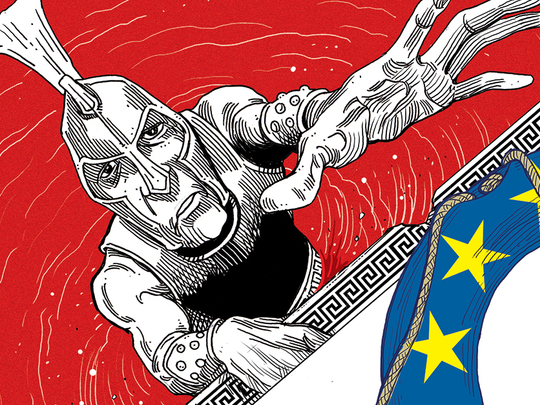
It is time for the Greeks and Europeans to continue talking. The Europeans need to recognise that their version of austerity cannot work in a Greece that is suffering the worst economic crisis of any developed nation. The belligerent Greek government needs to use its mandate from the referendum to stop grandstanding and to work with the Europeans.
If Greece needs to detach from the euro it must be done in some controlled manner, which might well involve launching its own version of the euro or even the drachma while keeping that new currency loosely linked to the euro. This is because for any country in such a desperate situation, the International Monetary Fund (IMF) has a standard formula of a write down of debts, balancing the budget and devaluing the currency based on the realistic premise that a country can only pay back what it can, and to go for more will be self-defeating.
The problem that Greece faces is that it can try to balance its budget and its creditors may write down the debt, but its membership of the euro does not allow it the vital third element of devaluing the currency and getting the necessary monetary stimulus, like Iceland, which recovered so quickly.
The wildly dramatic choices that have been proposed are very far from what needs to be done. Greece does not have to choose between staying in the euro and continuing to repay the crushing debt to its creditors that has crippled the country’s economy over the past two years, or defaulting on much of its debt and not only leaving the euro but also the European Union. Both of these routes are not serious options and unnecessarily destructive.
A third path is for Greece to acknowledge its debts, but pay them back on much longer terms so that the immediate debt burden is eased so Greece’s economy can recover. There is no benefit to anyone if Greece plunges into even more economic turmoil, as would happen if it became an international pariah cut off from the international credit markets. For example, the European Central Bank (ECB) has already been in touch with various immediate options.
German Chancellor Angela Merkel and French President Francois Hollande are leading the Eurozone cabal in their decision-making. Two more disparate people would be hard to find: The German fan of rigid austerity and the French supporter of reflation and stimulus. It is hard to imagine that they are running their currency with any common vision, other than mutual desperation to keep the euro out of the near terminal trouble it faced in 2011.
‘Unsustainable debt dynamics’
Their common approach on Greece will not be helped by the IMF, which released a report in which it admitted that there is no way Greece can ever pay back its debt under the current conditions, regardless of whichever way the referendum vote went. The IMF says that “coming on top of the very high existing debt, these new financing needs render the debt dynamics unsustainable”.
The atmosphere around the Greek talks seems to imply that the Eurozone is a powerful and well-managed political bloc. Nothing could be further from the truth, as the currency union was set up on political grounds with no merger of economic or fiscal policies of the member states. This insufficient foundation is why the currency had to fight for its life in 2011 when it only just survived and it is why more centralisation is vital in order to both strengthen the ECB and achieve greater convergence of the member states’ economic policies. A currency union cannot be managed by a loose committee of fractious nations and there may not be all that much time for the Eurozone members to make the changes and move to what the bureaucrats refer to as the “strong euro”.
Europe’s underlying lack of competitiveness may well trigger a future downturn, which will test the euro again. As Simon Tilford of the Campaign for European Reform argues: “The Eurozone is all but certain to go into the next downturn with interest rates close to, or at, zero, high levels of public and private sector indebtedness, and unemployment still well above pre-crisis levels. The ECB will be able to employ quantitative easing, but its effects will probably be exhausted by then. Critically, there will be little scope for fiscal policy to counter the weakness of private sector demand, especially in the countries most in need of it. And weak banks in struggling countries will still largely be back-stopped by fiscally constrained governments.” This is not encouraging news for Merkel and Hollande as they struggle to sort out their currency relationships with Greece.
The Eurozone needs to close down on its Greek drama by giving a long debt holiday of something like 20 years to allow the Greek economy to recover and start to make the money that will allow a future government to repay its debts and then focus on their real task of making the euro’s institutions strong enough so that the currency can flourish and withstand a future crisis.









